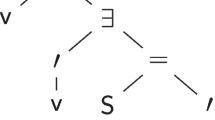Abstract
Modal logics have in the past been used as a unifying framework for the minimality semantics used in defeasible inference, conditional logic, and belief revision. The main aim of the present paper is to add adaptive logics, a general framework for a wide range of defeasible reasoning forms developed by Diderik Batens and his co-workers, to the growing list of formalisms that can be studied with the tools and methods of contemporary modal logic. By characterising the class of abnormality models, this aim is achieved at the level of the model-theory. By proposing formulae that express the consequence relation of adaptive logic in the object-language, the same aim is also partially achieved at the syntactical level.
Similar content being viewed by others
References
Avron, A., and I. Lev, A formula-preferential base for paraconsistent and plausible reasoning systems, Workshop on Inconsistency in Data and Knowledge (KRR-4) Int. Joint Conf. on AI (IJCAI 2001), 2001.
Baltag, A., and S. Smets, A qualitative theory of dynamic interactive belief revision, in G. Bonanno, W. van der Hoek, and M. Woolridge (eds.), Logic and the Foundations of Decision Theory, Amsterdam University Press, Amsterdam, 2008, pp. 11–58.
Batens D.: Paraconsistent extensional propositional logics. Logique & Analyse 23(90–91), 195–234 (1980)
Batens, D., Dynamic dialectical logics, in G. Priest, R. Routley, and J. Norman (eds.), Paraconsistent Logic—Essays on the inconsistent, Philosophia Verlag, München, 1989, pp. 187–217.
Batens, D., Inconsistency-adaptive logics, in E. Orlowska (ed.), Logic at Work—Essays dedicated to the Memory of Helena Rasiowa, Springer, Heidelberg, 1999, pp. 445–472.
Batens, D., A survey of inconsistency-adaptive logics, in D. Batens, C. Mortensen, G. Priest, and J. P. Van Bendegem (eds.), Frontiers of Paraconsistent Logic, Research-Studies Press, Baldock, 2000, pp. 49–73.
Batens D.: Minimally abnormal models in some adaptive logics. Synthese 125(1), 5–18 (2000)
Batens, D., A universal logic approach to adaptive logics, Logica Universalis 1(1):221–242, 2007.
Batens, D., Adaptive Logics and Dynamic Proofs. Mastering the Dynamics of Reasoning, with Special Attention to Handling Inconsistency, 2012 (manuscript).
Blackburn, P., M. De Rijke, and Y. Venema, Modal Logic, Cambridge University Press, Cambridge, 2001.
Boutilier C.: Conditional logics of normality: a modal approach. Artificial Intelligence 68, 87–154 (1990)
Girard, P., Modal logic for belief and preference change, PhD thesis, Department of Philosophy, Stanford University, Stanford. ILLC Dissertation Series DS-2008-04, 2008.
Hughes, G. E., and M. J. Cresswell, A New Introduction to Modal Logic, Routledge, London, 1996.
Makinson D.: Five faces of minimality. Studia Logica 52(3), 339–379 (1993)
Makinson, D., Bridges between classical and nonmonotonic logic, Logic Journal of the IGPL 11(1):69–96, 2003.
van Benthem, J., S. van Otterloo, and O. Roy, Preference logic, conditionals and solution concepts in games, in H. Lagerlund, S. Lindström, and R. Sliwinski (eds.), Modality Matters: Twenty-Five Essays in Honour of Krister Segerberg, Uppsala Philosophical Studies, Uppsala, 2006, pp. 61–77.
Author information
Authors and Affiliations
Corresponding author
Additional information
Presented by Heinrich Wansing
Rights and permissions
About this article
Cite this article
Allo, P. Adaptive Logic as a Modal Logic. Stud Logica 101, 933–958 (2013). https://doi.org/10.1007/s11225-012-9403-1
Received:
Published:
Issue Date:
DOI: https://doi.org/10.1007/s11225-012-9403-1



